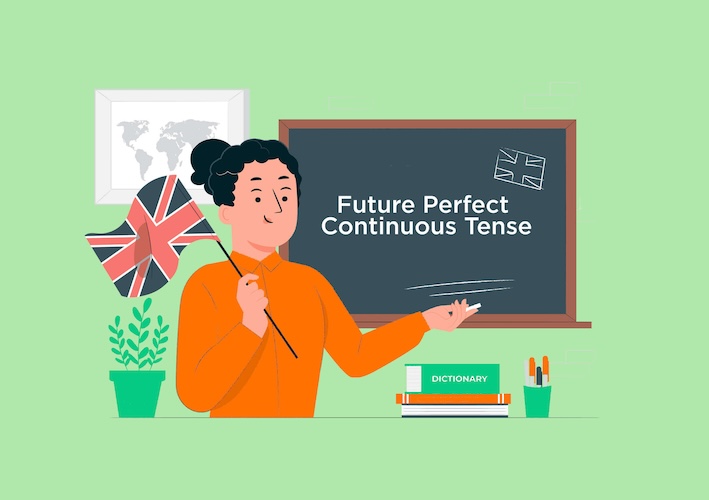
Future Perfect Progressive (Continuous)
We use the future perfect progressive form when we are looking back to the past from a point in the future and we want to emphasise the length or duration of an activity or event.
Table of Contents
1.Structures
1.1Structures of Sentences
To form the future perfect progressive tense, follow these basic rules:
S = Subject
won't = will not
Ving = main Verb+ing
QW = question word
| Structure | Examples | |
|---|---|---|
| + | S + will + have + been + Ving + ... | By the time she arrives, I will have been waiting for two hours. |
| - | S + won't + have + been + Ving* + ... | By the end of the month, she will not have been working here for a full year. |
| ? | (QW) + will + S + have + been + Ving + ...? | How long will you have been studying English by the end of this year? |
 Practice Examples
Practice Examples
By tomorrow, I (not/work) _____ here for a year yet.
By next month, they (not/live) _____ in this house for 10 years.
By next week, she (not/practice) _____ the guitar for long enough to perform.
2.use
2.1Emphasising the Length of an Event at a Time in the Future
Describing an action in the future perfect progressive tense, try to project yourself forward in time and look back at the duration of the activity. The activity will have begun sometime in the past, present, or in the future, and is expected to continue in the future.
A progressive form is used if we want to emphasise the continuity of a future achievement or actions that will continue up until a specific point in the future.
Focus on Duration: This tense is used to emphasize the duration of an action in progress at a certain future point or to describe ongoing actions leading up to a specified future time.
| Example | Comment |
|---|---|
| In November, I will have been working at my company for two months. | Now it's only September. I want to highlight the continuity of this future achievement of mine. |
| At five o’clock, I will have been waiting for two hours! | Now it's 4 o'clock and I've been waiting for already an hour. I'm looking back from a future perspective and want to emphasise the length of the activity. |
| When I turn twelve, I will have been playing guitar for five years. | I am 10 now and have been playing guitar for three years. I want to highlight the continuity of this future achievement of mine. |
| I'll have been teaching for twenty years this summer. | I'm so proud to be a teacher! I want to emphasise the duration of the activity. |
| When the train arrives, they will have been traveling for 8 hours. | Here we focus on the process and the duration. The action is expected to continue when the train arrives. |
As we can see, the tense emphasizes the duration of an action rather than just its completion.
 Practice Examples
Practice Examples
In September, the head teacher (teach) _____ at the school for 20 years.
In September, she (live) _____ in France for a year.
I (study) _____ English for three years by the end of this course.
Ready to Practice This Topic?
Join thousands of learners who are improving their English grammar skills every day with GrammarTrack.

